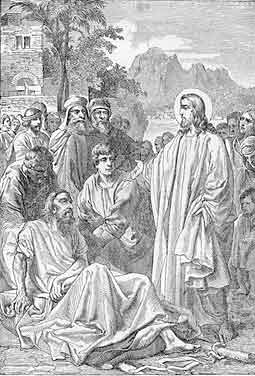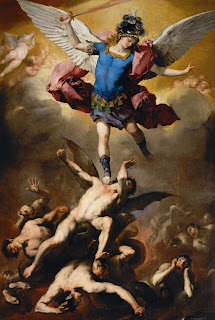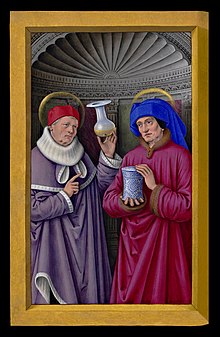At the Introit of the Mass the Church prays for the peace which God has promised by His prophets:
INTROIT Give peace, O Lord, to them that patiently wait for thee, that thy prophets may be found faithful: hear the prayers of thy servant, and of thy people Israel. (Ecclus. XXXVI. 18.) I rejoiced at the things that were said to me: we shall go into the house of the Lord. (Ps. CXXI. 1.) Glory etc.
COLLECT O Lord, inasmuch as without Thee we are not able to please Thee, let Thy merciful pity rule and direct our hearts, we beseech Thee. Thro'.
EPISTLE (I Cor. I. 4-8.) Brethren, I give thanks to my God always for you, for the grace of God that is given you in Christ Jesus, that in all things you are made rich in him, in all utterance and in all knowledge: as the testimony of Christ was confirmed in you, so that nothing is wanting to you in any grace, waiting for the manifestation of our Lord Jesus Christ who also will confirm you into the end without crime, in the day of the coming of our Lord Jesus Christ.
EXPLANATION St. Paul shows in this epistle that he possesses true love for his neighbor, because he rejoices and thanks God that he enriched the Corinthians with different graces and gifts, thus confirming the testimony of Christ in them, so that they could without fear expect His arrival for judgment. - Do thou also rejoice, with St. Paul, for the graces given to thy neighbor, for this is a mark of true charity.
 GOSPEL (Matt. IX. 1-8.) At that time, Jesus entering into a boat, passed over the water, and came into his own city. And behold, they brought to him one sick of the palsy lying in a bed. And Jesus seeing their faith, said to the man sick of the palsy: Be of good heart, son; thy sins are forgiven thee. And behold, some of the Scribes said within themselves: He blasphemeth. And Jesus seeing their thoughts, said: Why do you think evil in your hearts? whether it is easier to say, Thy sins are forgiven thee; or to say, Arise, and walk? But that you may know that the Son of man hath power on earth to forgive sins (then said he to the man sick of the palsy): Arise, take up thy bed, and go into thy house. And he arose, and went into his house. And the multitude seeing it feared, and glorified God who had given such power to men.
GOSPEL (Matt. IX. 1-8.) At that time, Jesus entering into a boat, passed over the water, and came into his own city. And behold, they brought to him one sick of the palsy lying in a bed. And Jesus seeing their faith, said to the man sick of the palsy: Be of good heart, son; thy sins are forgiven thee. And behold, some of the Scribes said within themselves: He blasphemeth. And Jesus seeing their thoughts, said: Why do you think evil in your hearts? whether it is easier to say, Thy sins are forgiven thee; or to say, Arise, and walk? But that you may know that the Son of man hath power on earth to forgive sins (then said he to the man sick of the palsy): Arise, take up thy bed, and go into thy house. And he arose, and went into his house. And the multitude seeing it feared, and glorified God who had given such power to men.
EXPLANATIONS
I. Those who brought this sick man to Christ, give us a touching example of how we should take care of the sick and help them according to our ability. Christ was so well pleased with their faith and charity, that He cured the man sick of the palsy, and forgave him his sins. Hence we learn how we might assist many who are diseased in their soul, if we would lead them to God by confiding prayer, by urgent admonitions, or by good example.
II. Christ did not heal the man sick of the palsy until He had forgiven him his sins, by this He wished to teach us, that sins are often the cause of sicknesses and other evils, by which we are visited, and which God would remove from us if we were truly repentant. This doctrine Jesus confirmed, when He said to the man, who had been sick for thirty-eight years: Sin no more, lest some worse thing happen to thee. (John V. 14.) Would that this were considered by those who so often impetuously demand of God to be freed from their evils, but do not intend to free themselves from their sins, which are the cause of these evils, by a sincere repentance.
III. "He blasphemeth." Thus thought the Jews, in their perverted hearts, of Christ, because they believed that He in remitting the sins of the sick man, usurped the rights of God and thus did Him a great injury; for it is blasphemy to think, say, or do any thing insulting to God or His saints. But these Jews did not consider that they by their rash judgment calumniated God, since they blasphemed Christ who by healing the sick man, and by numerous other works had clearly proved His God-head. If Christ so severely reprimanded the Jews, who would not recognize Him as God, for a blasphemous thought against Him, what will He do with those Christians who, though they wish to be adorers of God and His Son, nevertheless, utter blasphemies, curses, and profanations of the holy Sacraments?
IV. When Jesus saw their thoughts, He said: Why do you think evil in your hearts? This may be taken to heart by those who think that thoughts are free from scrutiny, and who never think to confess their evil and shameful thoughts. God; the most Holy and most just, will, nevertheless, not leave a voluntary unchaste, proud, angry, revengeful, envious thought unpunished, any more than an idle word. (Matt, XII. 36.) The best remedy against evil thoughts would be the recollection that God who searches the heart sees them, and will punish them.
PRAYER How great, O Jesus! is Thy love and mercy towards poor sinners, since Thou not only forgavest the sins of the man sick of palsy, but calling him son, didst console and heal him! This Thy love encourages me to beg of Thee the grace, that we may rise from our bed of sins by true penance, amend our life, and through the ways of Thy commandments enter the house of eternal happiness.
INSTRUCTION ON INDULGENCES
Be of good heart, son, thy sins are forgiven thee. (Matt. IX. 2.)
The same that Christ says to the man sick of the palsy, the priest says to every contrite sinner in the confessional, and thus remits the crime or the guilt of his sins, and the eternal punishment, by virtue of the authority given him by God. But since sins not only bring with them guilt and eternal punishment, but also temporal1 and indeed spiritual or supernatural punishment, such as, painful conditions of the soul, as well in this world as in purgatory, and natural ones, as: poverty, disease, all sorts of adversities and accidents, we should endeavor to liberate ourselves from them by means of indulgences.
What is an indulgence?
It is a total or partial remission of the temporal punishment which man would have to suffer either in this or the next life, after the sins have been remitted.
How do we know that after the remission of the sins there still remains temporal punishment?
From holy Scripture; for our first parents after the forgiveness of their sin, were still afflicted with temporal punishment. (Gen. III.) God likewise forgave the sins of the children of Israel, who murmured so often against Him in the desert, but not their punishment, for He excluded them from the Promised Land, and caused them to die in the desert. (Num. XIV.) Moses and Aaron experienced the same, on account of a slight want of confidence in God. (Num. XX. 12., Deut. XXXII. 51. 52.) David, indeed, received pardon from God through the Prophet Nathan for adultery and murder, (II Kings XII.) still he had to endure heavy temporal punishment. Finally, faith teaches us, that we are tortured in purgatory for our sins, until we have paid the last farthing. (Matt. V. 26.)
Did the Church always agree with this doctrine of Scripture?
Yes; for she always taught, that by the Sacrament of Penance the guilt and eternal punishment, due to sin, are indeed forgiven for the sake of the infinite merits of Jesus, but that temporal punishment still remains, for which the sinner must do penance. Even in the earliest ages she imposed great penances upon sinners for their sins which were already forgiven. For instance, murder or adultery was punished by a penance of twenty years; perjury, eleven; fornication, denial of faith or fortune-telling, by seven years of severe penance with fasting, etc. During this time it was not allowed to travel, except on foot, to be present at the holy Sacrifice of the Mass, or to receive the holy Eucharist. If the penitents showed a great zeal for penance and sincere amendment, or if distinguished members of the Church, particularly martyrs, interceded for them, the bishops granted them an indulgence, that is, they remitted the remaining punishment either totally or partially. In our days, on account of the weakness of the faithful, the Church is lenient. Besides the ecclesiastical, the spiritual punishments which would have to be suffered either here or in purgatory for the taking away of sins, are shortened and mitigated by indulgences through he treasure of the communion of saints.
Has the Church the power to remit temporal punishments, or to grant indulgences?
The Council of Trent expressly states, that the Church has power to grant indulgences, (Sess. 25.) and this statement it supports by the words of Christ. For as Christ protests: Amen, I say to you, whatsoever you shall bind upon earth, shall be bound also in heaven; so He also promised, that whatever the Church looses upon earth, is ratified and loosed in heaven. Whatsoever you shall loose upon earth, shall be loosed also in heaven. (Matt. XVIII. 18.) Even an apostle granted an indulgence. In the person and by the power of Christ, that his spirit might be saved in the day of our Lord Jesus Christ, (II Cor. II. 10.; I Cor. V. 4. 5.) St. Paul forgave the incestuous Corinthian, upon whom he had imposed a heavy punishment.
What is meant by saying, indulgences are granted out of the treasury of the saints or of the Church?
By this is meant that God, by the Church, remits the temporal punishment due to sin for the sake of the merits of Christ and the saints, and supplies, as it were, by these merits what is still wanting in our satisfaction.
What kinds of indulgences are there?
Two; plenary and partial indulgences. A plenary indulgence, if rightly gained, remits all ecclesiastical and temporal punishment, which we would otherwise have to expiate by penance. A partial indulgence, however, remits only so many days or years of the temporal punishment, as, according to the penitential code of the primitive ages of the Church; the sinner would have been obliged to spend in severe penance. Hence the name forty day's indulgence, etc.
What is a Jubilee?2
It is a plenary indulgence, which the pope grants to the faithful of the entire world, whereby all the temporal punishments of sin, even in cases reserved to the pope or the bishops, are remitted, and forgiven in the name of God, if the sinner confesses contritely and receives the holy Eucharist and has a firm purpose of doing penance.
What is required to gain an indulgence?
First, that we should be in the state of grace, and have already obtained, by true repentance, forgiveness of those sins, the temporal punishment of which is to be remitted by the indulgence; and secondly, that we should exactly perform the good works prescribed for the gaining of the indulgence.
Do indulgences free us from performing works of penance?
By no means: for there are few in the proper state to receive a plenary indulgence in its fulness, since not only purity of soul is necessary but also the inclination to sin must be rooted out, it therefore cannot be the intention of the Church to free us from all works of penance by granting us indulgences. She cannot act contrary to the word of Jesus: Unless you do penance, you shall all likewise perish. Luke XIII. 3.) She rather wishes to assist our weakness, to supply our inability to do the required penance, and to contribute what is wanting in our penance, by applying the satisfaction of Christ and the saints to us by indulgences. If we, therefore, do not wish to do penance for our own sins, we shall have no part in the merits of others by indulgences.
Can indulgences be gained for the souls of the faithful departed?
Yes, by way of suffrage, so far as we comply with the required conditions, and thus beg of God, for the merits of His Son and the saints, to release the souls in purgatory. Whether God receive this petition or not, remains with Him, He will act only according to the condition of the deceased. We must, therefore, not depend upon the indulgences and good works which may be performed for us after death, but rather endeavor, during our life-time, to secure our salvation by leading a pious life; by our own good works and by the gaining of indulgences.
What follows from the doctrine of the Church concerning indulgences?
That an indulgence is no grant or license to commit sin, as the enemies of the Church falsely assert; that an indulgence grants no forgiveness of sins past or future, much less is permission given to commit sin; that no Catholic can believe that by gaming indulgences he is released from penance, or other good works, free from the fight with his evil inclinations, passions and habits, from compensating for injuries, repairing scandals, from retrieving neglected good, and glorifying God by works and sufferings; but that indulgences give nothing else than partial or total remission of temporal punishment; that they remind us of our weakness and lukewarmness which is great when compared with the zeal and fervor of the early Christians; that they impel us to satisfy the justice of God according to our ability. Finally, they remind us to thank God continually that He gave the Church a means in the inexhaustible treasure of the merits of Christ and His saints, to help our weakness and to supply what is wanting in our penance.
Fr Goffine







